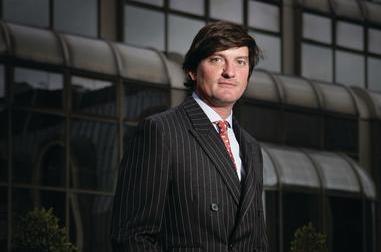David Howden, founder and CEO of Howden, gave a keynote speech at the COP28 summit on the power of the private sector to protect vulnerable countries against the effects of climate change and unlock investment in their future.

The power of the private sector to boost the resilience of countries most vulnerable to climate change was the topic of a speech given by David Howden at the COP28 climate change summit in the UAE.
He delivered his speech on “loss and damage” at the Island of Hope, in the COP28 Innovation Zone.
Howden underlined that for one dollar spent before a natural catastrophe strikes, a vulnerable economy can achieve the same impact as around six dollars spent after a disaster event takes place.
Three months after devastating floods hit Pakistan, a UN emergency appeal saw $9bn committed by international donors to help the country recover, he noted, but that that this money has yet to arrive.
“For some reason, there seems to be a belief that the climate risks for vulnerable countries in the Global South are uninsurable. The problem isn’t that they’re uninsurable, it’s that there has been nobody to pay the premium at the scale required. However, the Loss and Damage fund has the power to change that,” Howden said.
“Earlier this year, reflecting on COP27, I asked the question: “Has anyone actually modelled the risks of these countries and calculated how much is needed to protect them?” Remarkably, the answer was ‘no’,” he said.
Howden has collaborated with researchers at Cambridge University on addressing the issue.
The research found that the smallest, most vulnerable countries currently risk losing over 100% of their GDP from extreme climate shocks. The broker said it had reached a way to cap the loss at 10% of their GDP.
He said that for $1bn, less than 1% of the targeted $100bn Loss and Damage (L&D) fund, around $75bn of protection can be found, which could be scaled to protect all 100 L&D recipient countries from their highest priority risks.
“What was different about their research was that it looked at losses as a percentage of GDP. The reason this is so important is because it shifts the focus to protecting countries not buildings,” he said.
“By understanding the risk to the entire economy, we were able to calculate what it would cost to put in place a contractual guarantee to pre-agreed finance. This provides both the funding needed to respond to a disaster and the certainty that these economies aren’t going to be wiped out,” he continued.
Howden added: “These are two sides of a very powerful coin: guaranteed, pre-agreed finance to respond when a disaster hits – or indeed even before - and the certainty needed to make vulnerable countries more investable, making this model the most economically powerful way to use donor money.”
He rounded off his speech with three calls to action:
- “First – we want to work with climate vulnerable countries to build this into a reality.
- “Second – we want the private sector to get behind this as crucial mechanism to have in place to make these countries more investable.
- “And third – we need support from donor countries to get this off the ground.”
Howden said: “The poorest and most vulnerable have no safety net. For billions of people, if their home or land is wiped out that means nowhere to live and no income. Pre-arranged finance not only provides the opportunity to rebuild after a disaster has happened. By reducing vulnerability, it also provides families, communities, governments and investors with the confidence to invest in the future.
“Everything points to climate disasters getting worse before they get better but the economic impact on those worst hit need not. Capping the loss at 10% of GDP, and guaranteeing pre-agreed funding, paid immediately, provides certainty and the confidence to invest. And we have put a price on that,” he said.










No comments yet